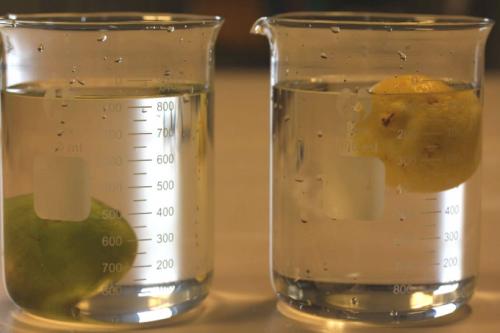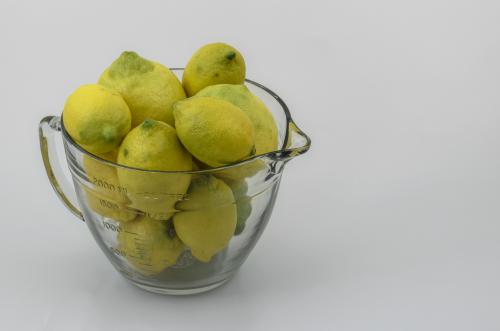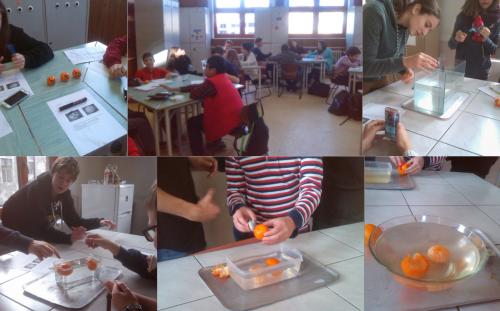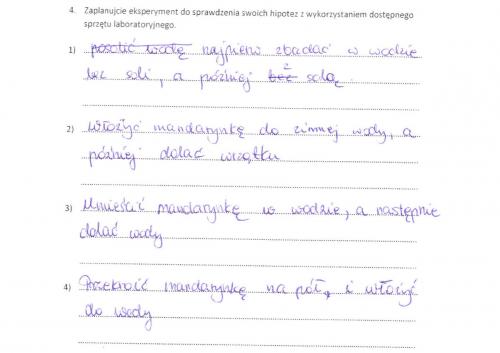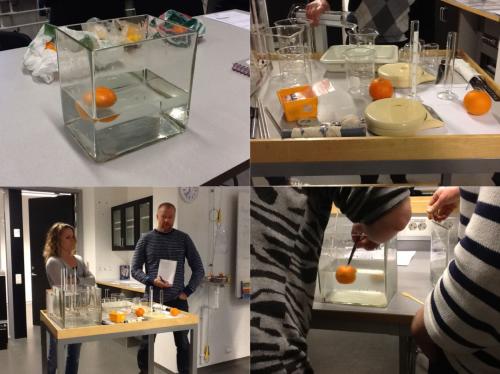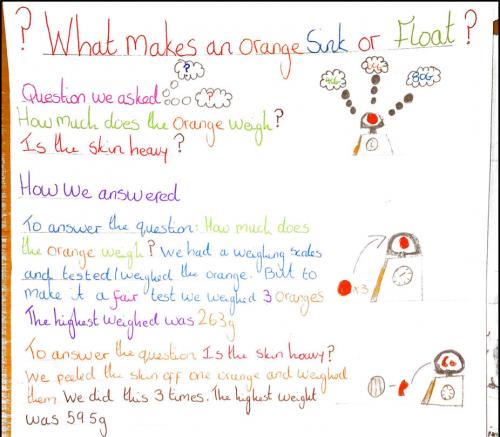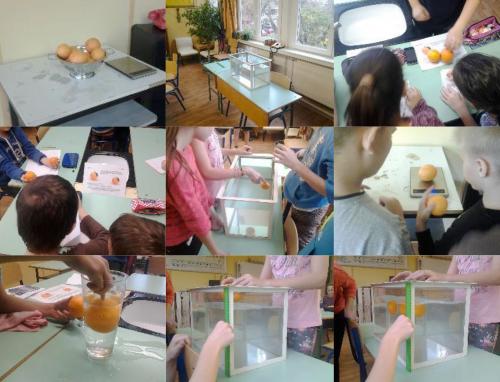The Oranges SAILS inquiry and assessment unit focuses on studying floating oranges as a model system to relate the physics concept of density and Archimedes principle with students’ daily lives. This unit was designed as an inquiry activity that allows teacher to assess during the process of the inquiry. Students work in groups to develop hypotheses about the behaviour of oranges in water, and verify their hypotheses by experimentation. This unit is recommended for implementation at lower second level and the unit activities are presented as an open inquiry; however, it has been implemented across the range from guided to open inquiry.
Implementation of this unit is suggested for assessment of students’ skills in developing hypotheses and planning investigations, as well as enhancing their scientific literacy as they learn to explain the science behind the observed phenomena. Assessment methods include classroom dialogue and evaluation of student devised materials.
This unit was trialled in Germany, Hungary, Poland, Sweden and the United Kingdom – producing eight case studies of implementation. In Sweden, the implementation was with a group of in-service teachers, while the other case studies were all with lower second level students. In different country contexts, the teachers had varying pedagogic aims and so adapted the unit to suit their classes. Planning investigations and developing hypotheses were assessed in most cases, while working collaboratively was assessed in four of the eight case studies. Key assessment methods used include classroom dialogue, teacher observation and evaluation of student artefacts.
- Density
- Archimedes principle
- Lower
- Planning investigations
- Developing hypotheses
- Forming coherent arguments
- Working collaboratively
- Scientific reasoning
- Scientific literacy
- Classroom dialogue
- Teacher observation
- Peer-assessment
- Self-assessment
- Worksheets
- Student devised materials
- Presentations
The teaching and learning activities described in the Floating orange SAILS unit were developed by Dr Christine Harrison at Kings College London as part of the SAILS project. This unit was designed initially for teachers in England because they were eager to move away from assessing inquiry skills through laboratory reports and wanted to start assessing during the process of the inquiry. One of the skills they were keen to encourage in their learners was raising their own questions and then devising appropriate methods to test their ideas. Further skills that they were keen to begin encouraging and assessing was teamwork and collaboration, which the teachers felt were important life skills that an inquiry approach can engender. Therefore, this activity is designed to allow students (11-14 years) to raise scientific questions. This unit can be implemented in a single lesson and is valuable for introducing the concepts of inquiry to students.
In this section we present some tools for formative assessment, aimed at verifying the development of inquiry skills of developing hypotheses, planning investigations and working collaboratively, as well as their ability to communicate what they did and why they did it. This is a very open activity, and can be adapted for evaluation of a variety of skills. Assessment methods include classroom dialogue, teacher observation and evaluation of student artefacts, and may be extended to include peer- and self-assessment.
A suggested four-level rubric is provided, which details success criteria for students at the emerging, developing, crafting and extending performance levels
Below you can find the full inquiry and assessment unit for download, as well as an archive with classroom materials, including student worksheets and assessment tools for teachers to be used during the activities if available.
Unit booklet Classroom materials| Concept focus |
Density
Archimedes’ principle
|
| Inquiry skills focus |
Planning investigations
Developing hypotheses
Working collaboratively
|
| Scientific literacy |
Explain phenomena scientifically
|
| Assessment methods |
Classroom dialogue
Teacher observation
Student devised materials
|
This unit was trialled in five countries, producing eight case studies of its implementation – CS1 Germany, CS2 Germany, CS3 Hungary, CS4 Poland, CS5 Sweden, CS6 United Kingdom, CS7 United Kingdom and CS8 Hungary. The activities were carried out with lower second level students in all of the case studies, except CS5 Sweden, which details implementation with in-service teachers who had limited experience of assessment of inquiry activities. Classes were of mixed gender, and students were aged 11-15 years. In the examples with lower level students, the case studies were implemented by teachers who had some experience of teaching through inquiry but the students involved had generally not been taught through inquiry. In general, the case studies concern a single class period of around an hour, with the exception of CS2 Germany and CS3 Hungary, who carried out the inquiry over nine or three 45-minute lessons, respectively.
The case studies focus primarily on development of inquiry skills and on assessment of skills in planning investigations and developing hypotheses. In addition, working collaboratively was assessed in four of the eight case studies. Commonly used assessment methods include classroom dialogue and teacher observation, as well as evaluation of worksheets or student devised materials.
The Floating orange SAILS unit outlines a single open activity, which teachers can tailor to better suit their student groups. In each of the case studies, the students explicitly or implicitly dealt with density. This led them to take measurements of the way the oranges and other fruits floated in water. The inquiry approach used across the case studies ranged from open to guided inquiry. In CS2 Germany, CS5 Sweden, CS6 United Kingdom, CS7 United Kingdom and CS8 Hungary an open inquiry approach was taken, where the participants were provided with apparatus to explore ideas and generate a question, which they then investigated. In CS3 Hungary and CS4 Poland, the teacher set the inquiry question through an introduction and worksheet instructions that guided the students towards generating a question and working out how to test this. CS1 Germany took a bounded inquiry approach by the teacher providing a broad inquiry question – Do different citrus fruits have the same floating characteristics – which the students then had to plan an inquiry to answer.
Almost all case studies focused on the planning aspects of inquiry, as suggested in the unit. However, given the open nature of the activity, it was possible for teachers to choose particular aspects for development. Planning investigations and developing hypotheses were assessed in most case studies, while working collaboratively was also widely assessed. Other skills chosen for the assessment were forming coherent arguments (in CS4 Poland and CS8 Hungary), scientific literacy (critiquing experimental design in CS5 Sweden and using explaining phenomena scientifically in CS8 Hungary) and scientific reasoning (collection of data and observation in CS5 Sweden). While CS5 Sweden looked to assess all aspects of an investigation, it is important to note that this implementation was with teachers rather than school students and so could take a broader look at the assessment.
Below you can find the full inquiry and assessment unit for download (excluding the case studies), as well as an archive containing all the case studies.
Unit booklet Case studies| Concept focus |
Development of process-oriented competencies
|
| Activities implemented |
Floating orange
|
| Inquiry skills assessed |
Planning investigations
Working collaboratively
|
| Assessment methods |
Classroom dialogue
Self-assessment
Student devised materials
|
| Level |
Lower
|
| Age |
13-14
|
| Prior experience with inquiry |
Some experience
|
| Concept focus |
Introducing density
|
| Activities implemented |
Floating orange
|
| Inquiry skills assessed |
Planning investigations
Developing hypotheses
|
| Assessment methods |
Classroom dialogue
Peer-assessment
Student devised materials
|
| Level |
Lower
|
| Age |
12
|
| Prior experience with inquiry |
No experience
|
| Concept focus |
Introducing density
Developing inquiry skills
|
| Activities implemented |
Floating orange
|
| Inquiry skills assessed |
Planning investigations
Developing hypotheses
|
| Scientific reasoning |
Collecting scientific data
Recording data
|
| Assessment methods |
Classroom dialogue
Teacher observation
Worksheets
|
| Level |
Lower
|
| Age |
12-13
|
| Prior experience with inquiry |
No experience
|
| Concept focus |
Development of inquiry skills
|
| Activities implemented |
Floating orange
|
| Inquiry skills assessed |
Planning investigations
Developing hypotheses
Forming coherent arguments
Working collaboratively
|
| Assessment methods |
Classroom dialogue
Teacher observation
Worksheets
|
| Level |
Lower
|
| Age |
10-13
|
| Prior experience with inquiry |
Some experience
|
| Concept focus |
Assessment of inquiry skills
|
| Activities implemented |
Floating orange
|
| Inquiry skills assessed |
Planning investigations
Developing hypotheses
|
| Scientific reasoning |
Recording data and observations
|
| Scientific literacy |
Critiquing experimental design
|
| Assessment methods |
Classroom dialogue
Teacher observation
Peer-assessment
|
| Level |
Upper
|
| Age |
28-64
|
| Prior experience with inquiry |
Some experience
|
| Concept focus |
Developing inquiry skills
|
| Activities implemented |
Floating orange
|
| Inquiry skills assessed |
Planning investigations
Developing hypotheses
Working collaboratively
|
| Assessment methods |
Classroom dialogue
Teacher observation
|
| Level |
Lower
|
| Age |
12-13
|
| Prior experience with inquiry |
No experience
|
| Concept focus |
Development of inquiry skills
|
| Activities implemented |
Floating orange
|
| Inquiry skills assessed |
Developing hypotheses
Working collaboratively
|
| Assessment methods |
Classroom dialogue
Teacher observation
Self-assessment
Presentations
|
| Level |
Lower
|
| Age |
12-13
|
| Prior experience with inquiry |
Some experience
|
| Concept focus |
Development of inquiry skills
Ability to communication scientifically
|
| Activities implemented |
Floating orange
|
| Inquiry skills assessed |
Planning investigations
Developing hypotheses
Forming coherent arguments
|
| Scientific literacy |
Use of scientific language
Ability to explain phenomena scientifically
|
| Assessment methods |
Classroom dialogue
Teacher observation
Student devised materials
|
| Level |
Lower
|
| Age |
11-12
|
| Prior experience with inquiry |
No experience
|

